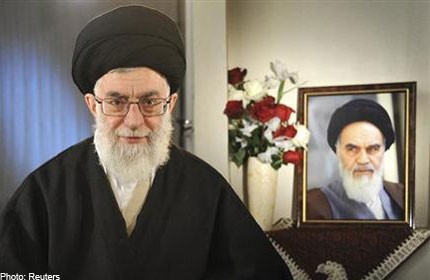World powers, Iran in new attempt to reach nuclear deal

GENEVA - World powers aim to reach a preliminary deal to curb Iran's nuclear programme in politically charged talks resuming in Geneva on Wednesday.
Seeking to end a long standoff and head off the risk of a wider Middle East war, the United States, Russia, China, France, Britain and Germany came close to winning concessions from Iran on its nuclear work in return for some sanctions relief at negotiations earlier this month.
Top policymakers from the six have since said that an interim accord on confidence-building steps could finally be within reach. But diplomats caution that differences remain and could still prevent an agreement.
Russia is hopeful that a preliminary deal will emerge this week, Foreign Minister Sergei Lavrov said. "We hope the efforts that are being made will be crowned with success at the meeting that opens today in Geneva," he told a news conference on Wednesday.
Iranian Supreme Leader Ayatollah Ali Khamenei said Tehran would not step back from its nuclear rights and he had set "red lines" for his negotiators in Geneva. But Tehran wanted friendly ties with all countries, including the United States. "We want to have friendly relations with all nations, even the United States," he told an audience of Basij militiamen. "Death to America," the militiamen chanted in response, repeating one of the main rallying cries for supporters of the Islamic Republic.
The last meeting stumbled over Iran's insistence that its"right" to enrich uranium be recognised, and disagreement over its work on a heavy-water reactor near Arak, which could yield plutonium for atomic bombs once it becomes operational.
Iranian Foreign Minister Mohammad Javad Zarif has since indicated a way around the first sticking point, saying Tehran has the right to refine uranium but is not insisting others recognise that right.
A UN report last week showed Iran had stopped expanding its enrichment of uranium and had not added major new components at Arak since August, when moderate Hassan Rouhani replaced hardliner Mahmoud Ahmadinejad as president.
Nuclear analyst Ali Vaez of the International Crisis Group think-tank said the "body language" showed that the sides were ready for a deal, pointing to Iran slowing its nuclear push and Washington refraining, so far, from imposing more sanctions. "(They) have demonstrated that they are looking to transform stumbling blocks into stepping stones," Vaez said.
Zarif, Tehran's chief nuclear negotiator, said on the eve of the meeting there was "every possibility" of a successful conclusion provided there was good faith and the political will among all involved to resolve problems.
US President Barack Obama sounded a more cautious note on Tuesday, saying it was unclear whether the world powers and Iran will be able to reach an agreement soon.
American lawmakers urged the Obama administration on Tuesday to take a tougher line with Iran.
The talks are expected to resume with a meeting between Zarif and European Union foreign policy chief Catherine Ashton, who coordinates contacts with Iran on behalf of the powers.
Western governments suspect Iran has enriched uranium with the covert aim of developing the means to fuel nuclear weapons, which Tehran denies. Refined uranium can fuel nuclear power plants - Iran's stated goal - but also provide the core of a nuclear bomb, if enriched further.
After years of confrontation, a shift towards meaningful diplomacy between Iran and the world powers began after the June election of Rouhani on a platform to relieve the Islamic Republic's increasing international isolation and get sanctions strangling its oil-dependent economy lifted.
Rouhani wants to move quickly: Western sanctions have reduced Iran's daily oil export revenue by 60 per cent since 2011 and caused its currency to collapse.
But diplomats say Iran has so far refused to meet all of the powers' demands. They include suspending enrichment of uranium to 20 per cent fissile purity - a significant advance toward the threshold for bomb fuel - as well as limiting its enrichment capacity and mothballing the Arak reactor project.
The Iranian assets that would be unfrozen as part of any deal this week would amount to less than $10 billion, US national security adviser Susan Rice told CNN.
Western diplomats have kept much of the details of the proposed deal under wraps but said Iran would not win relief from the most painful sanctions on oil trade and banking that many believe finally forced into serious negotiations.
Under an initial deal the OPEC producer is likely to regain access to precious metals markets and trade in petrochemicals, an important source of export income, and could see the release of some of its oil revenues frozen in oversees accounts.
If an agreement is struck in the coming days, it is intended to be the first step on the road towards a broader settlement that would avert the threat a new Middle East war.
In crafting a deal, Western governments are wary of critics across the Middle East, especially in Israel and Saudi Arabia, who view Iran as a deadly threat, and of hawks in the US Congress who want stiffer sanctions and terms for Tehran.
Obama warned Congress on Tuesday that Iran would make progress towards nuclear arms status if there were no deal to halt or roll back its nuclear programme and urged lawmakers to hold off on tightening sanctions while talks continue.
Prime Minister Benjamin Netanyahu warned Washington, Israel's main ally, to avoid making a "historical mistake" when negotiators appeared close to a deal this month. Israel wants Iran to scrap its entire nuclear energy infrastructure.
Israel, widely assumed to be the only nuclear power in the Middle East, has warned it may bomb Iranian nuclear facilities if it deems diplomacy futile in reining in Tehran before it attains nuclear "breakout" capability.